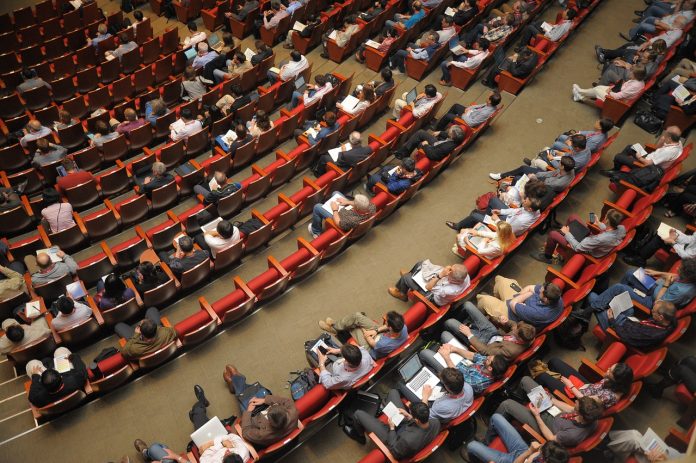Leaders of the U.S. bishops’ conference on issues of immigration and racism denounced xenophobic and dehumanizing language in the United States, warning that it fosters discrimination and hatred.
“The tragic loss of life of 22 people this weekend in El Paso demonstrates that hate-filled rhetoric and ideas can become the motivation for some to commit acts of violence,” the bishops said.
“The anti-immigrant, anti-refugee, anti-Muslim, and anti-Semitic sentiments that have been publicly proclaimed in our society in recent years have incited hatred in our communities.”
The statement was issued Aug. 8 by Bishop Joe Vásquez of Austin, head of the U.S. bishops’ migration committee; Bishop Frank Dewane of Venice, Florida, chair of the domestic social development committee; and Bishop Shelton Fabre of Houma-Thibodaux, head of the ad hoc committee against racism.
On Saturday Aug. 3, an armed man opened fire at a shopping complex in El Paso, Texas, killing 22 and injuring more than two dozen, according to police reports. The suspect is in custody.
The shooter reportedly published a four-page document online in the hours before the attack, detailing his hatred toward immigrants and Hispanics. He also reportedly described the weapons he would use in the shooting. Police said he appeared to have been targeting Latinos during the attack.
Following the shooting, critics quickly turned their attention to President Donald Trump, noting that the suspect’s manifesto had echoed some of his language, such as characterizing immigrants as an “invasion.” They also denounced the president’s derogatory comments aimed at cities and countries with large black populations, and his suggestion that four Democratic congresswomen of color “go back” to their home countries, despite their being U.S. citizens.
“Donald Trump has created plenty of space for hate,” said presidential hopeful Senator Elizabeth Warren. “He is a racist. He has made one racist remark after another. He has put in place racist policies. And we’ve seen the consequences of it.”
Senator Bernie Sanders, who is also running for president, tweeted at Trump after the shooting, “Your language creates a climate which emboldens violent extremists.”
Rep. Alexandria Ocasio-Cortez (D-N.Y.) went a step further, calling Trump’s rhetoric on immigration “directly responsible” for the El Paso shooting.
In his initial response to the shooting, Trump condemned the violence but did not mention white nationalism. In a later televised appearance, he said, “In one voice our nation must condemn racism, bigotry, and white supremacy.”
On the day of the shooting, Cardinal Daniel DiNardo of Galveston-Houston, president of the U.S. bishops’ conference, and Bishop Dewane issued a statement, denouncing the violence as “senseless and inhumane” and calling for legislation to address “the plague that gun violence has become” in the United States.
The second statement from the U.S. bishops comes as criticism mounts against the president for his rhetoric regarding minorities.
In their Aug. 8 statement, the bishops did not reference Trump, or any other political leader, by name. Instead they asked all Americans “to stop using hate-filled language that demeans and divides us and motivates some to such horrific violence.”
The noted that racial hatred was also apparent as a motivation in last year’s Tree of Life Synagogue shooting in Pittsburgh and the Mother Emanuel AME Church shooting in Charleston in 2015.
“[W]e ask our leaders and all Americans to work to unite us as a great, diverse, and welcoming people,” the bishops said.
While the bishops’ statement avoided calling out Trump by name, San Antonio Archbishop Gustavo García-Siller addressed the president in his initial response to the shooting several days earlier.
On his personal Twitter account, the archbishop posted Aug. 5, “President you are a poor man, a very week [sic] man. Stop damaging people. Please!” A second tweet read, “President stop your hatred. People in the US deserve better.”
The tweets were later deleted.
In a video posted to the archdiocesan Facebook page the next day, García-Siller said, “I regret that my recent Tweet remarks were not focused on the issues, but on an individual.”
“All individuals have God-given dignity and should be accorded respect and love as children of God,” the archbishop said, adding, “We should be aware of this in our discourse about the office of the president of the United States, which is due our respect.”
García-Siller encouraged prayers for the victims of violence and said his desire is to bring hope and healing, and act in a way that reflects civility and builds unity.
“If I have added to anyone’s pain at this emotional time, I deeply regret it.”
The archbishop reiterated his condemnation of racism, which he said is still a problem in America today.
“No one has the moral right to make racist statements,” he said, denouncing harassment of immigrants and rhetoric that instigates fear.
“We must pray fervently for peace amidst all the violence which seems to be overwhelming in our society. We must be lights in the darkness,” the archbishop concluded. “We do not need more division, but rather we need to move forward in freedom to discuss these topics more deeply in light of the Gospel.”














